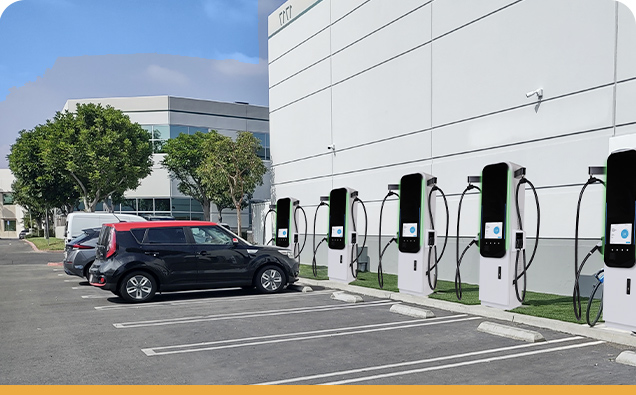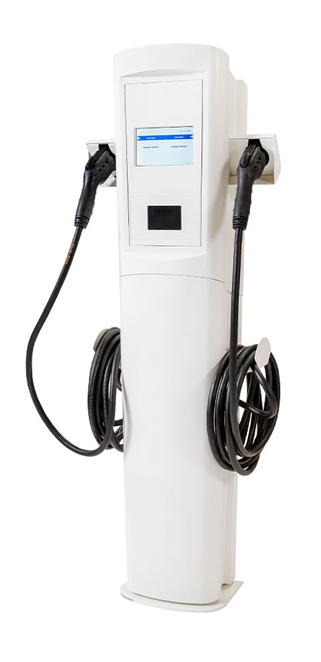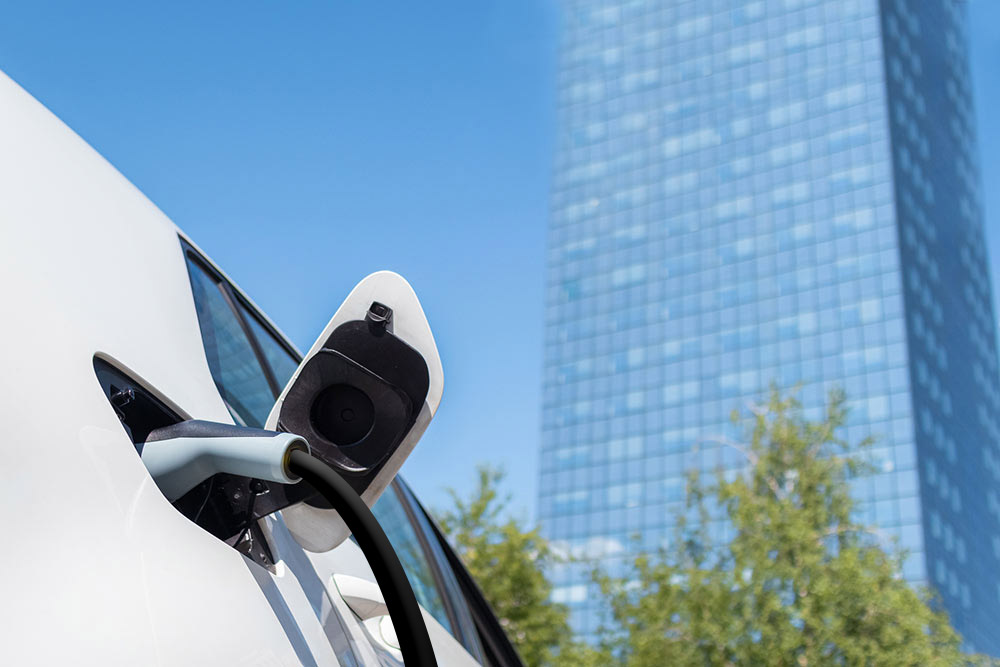On-Site Workplace EV Chargers
Electric vehicle adoption is accelerating. BloombergNEF predicts global passenger EV sales to reach 722 million by 2040 and represent a $242 billion charging infrastructure market opportunity1. Chances are that the transition from gas-powered vehicles to hybrid or electric is happening right in your office building. Companies can install EV charging stations in workplaces to support this transition and benefit from it at the same time. Two upfront questions can help with the process: what type of EV charging stations will best serve the organization, and why install EV charging stations in the first place?

Why install workplace EV chargers?
- Attract and retain talent: Installing workplace EV chargers significantly improves employee satisfaction and helps recruit top talent. With the challenges of attracting and retaining qualified talent, offering sustainable amenities becomes increasingly important for attracting environmentally conscious employees.
- Support employee needs: Most vehicles are parked 95% of the time, primarily at home or work. Workplace charging becomes essential for employees who lack home charging access and provides convenience for those who spend part of their work week on-site.
- Generate additional revenue: Depending on where the charging stations are located and the level of security a company must maintain, an organization can make charging stations available to the public after business hours or on weekends to collect payments that can help offset the cost of their installation and maintenance.
- Flexible workplace integration: Charging infrastructure can adapt to various work environments. Companies can designate employee-only stations, combine employee and public access, or adjust availability based on office occupancy patterns.
- Future-proof facilities: With zero-emission vehicles projected to reach 73 million per year by 2040, having charging infrastructure helps position workplace parking facilities for future workforce needs.
- Demonstrate environmental commitment: Organizations can demonstrate their commitment to sustainability by installing one or more office EV charging stations. This visible investment in green infrastructure helps build trust with employees and stakeholders while supporting corporate environmental initiatives. Organizations can also track and report CO2 reductions to demonstrate progress toward company-wide sustainability targets.
Choosing the right commercial EV charger management solution

Level 2 EV chargers
Level 2 EV chargers are an excellent choice for most workplace EV charging applications:
- Cost-effective: They are less expensive to install and operate than Level 3 DC fast chargers.
- Workday charging: They can fully charge most EVs in 6-8 hours, perfect for standard workday parking.
- Universal compatibility: Level 2 chargers are currently considered universal across all EV models.
- Lower power requirements: They don’t require as much electrical infrastructure as DC fast chargers.

Level 3 EV chargers
L3 DC fast chargers While representing a more expensive initial investment, DC fast chargers offer several benefits:
- Rapid charging: They can charge most EVs to 80% in 30-60 minutes, ideal for corporate visitors, vendors and flexible workspace users.
- Attract talent: The speed and convenience of fast charging can serve as a valuable recruiting tool.
- Showcase commitment: DC fast chargers demonstrate an organization’s investment in cutting-edge sustainability technology to help with brand image.
- Support all EV types: Accommodates various EV models, including luxury and performance vehicles.
- Revenue potential: These chargers can be configured for public use during off-hours to generate additional revenue.
Strategic EV charger placement considerations
When selecting EV charger installation locations, prioritize high-visibility areas near building entrances to ensure easy access and highlight your company’s commitment to sustainability. Equally important is considering proximity to existing electrical infrastructure to minimize installation costs. Additionally, researching grants and funding opportunities can offset upfront expenses, making the project more feasible.
Tailoring workplace EV Chargers to business needs
Companies of all sizes can benefit from EV charger installations, though challenges vary depending on business type and target users. For instance, a small floral shop with a few delivery vans charging overnight might only need dedicated Level 2 chargers in a secure fenced area or garage. On the other hand, larger organizations with expansive campuses and multiple parking areas should devise strategic plans to distribute chargers based on employee density, duration of stay and mixed-use cases.
Key considerations in planning:
- ADA compliance: Include accessible charging spaces with clear pathways to meet legal requirements and promote inclusivity.
- Vehicle types and use cases: Evaluate whether your workplace serves larger trucks, delivery vehicles, or specialized fleets. The type of vehicle and its charging duration will help determine whether to install Level 2 chargers, DC fast chargers or a combination.
- Public access and revenue: Decide if chargers will be available to the public after business hours to generate revenue or reserved exclusively for employees, vendors, and visitors.

Ensuring a high-quality charging experience with the right EV charger manufacturer
Invest in a robust, reliable charging system that meets the demands of your facility’s use cases. A high-quality charger minimizes downtime, supports long-term usage, and enhances user satisfaction. Review different EV charger manufacturers to find EV chargers that can withstand heavy, frequent use.
Also, consider that you’ll probably need an EV charger that can collect information. EV charger manufacturers can customize chargers to track usage and add the features needed to collect authorization or payment.
Moving forward with workplace EV charging stations
As workplace EV charging becomes increasingly essential, organizations should adopt a scalable implementation strategy that addresses current needs while accommodating future growth. Begin with a pilot program to evaluate usage patterns and gather data on employee and visitor charging habits. Expand the charging network incrementally to match demand based on the insights gained on utilization rates and user feedback.
By combining thoughtful planning, exploring funding opportunities and focusing on immediate and long-term user needs, your organization can develop a sustainable, adaptable and efficient EV charging solution.
Interested in getting started on installing your workplace EV chargers? Contact BTC POWER, North America’s leading commercial EV charger manufacturer, to get started on your customized EV charger systems.

Frequently Asked Questions
Installing EV chargers at an office involves several cost factors that vary significantly based on your situation. For Level 2 office EV chargers, costs include both hardware and installation expenses. The final investment depends on your building’s existing electrical capacity, the distance from electrical panels to charging locations, and any necessary infrastructure upgrades.
Many businesses find installing workplace EV chargers more affordable through available utility rebates, tax incentives, and depreciation benefits. These financial incentives can substantially offset a significant portion of the installation expenses when strategically planned. Additionally, workplace EV chargers often provide secondary benefits through improved employee satisfaction, tenant retention, and enhanced corporate sustainability metrics.
Yes, commercial EV chargers do make money through multiple revenue streams. Beyond direct charging fees, businesses report increased customer dwell time, heightened property values, improved tenant retention, and strengthened corporate sustainability metrics. The optimal approach balances convenience for employees while capturing reasonable usage fees from visitors.
Maximizing revenue potential often depends on implementing flexible payment solutions that accommodate user preferences. Modern commercial charging systems like BTC POWER’s Level 2 or DC fast chargers product families support multiple authentication and payment methods—including RFID, credit card, QR code, and mobile app payments—enabling businesses to easily monetize their charging infrastructure while providing payment convenience for users.
This payment flexibility allows for creative pricing models such as free charging during business hours for employees while generating revenue from public users or implementing time-based pricing structures during peak demand periods.
EV charging stations’ profit margin typically ranges from 20-35% when implementing innovative pricing strategies. Businesses maximize returns by balancing competitive rates with operational costs. The most successful commercial EV charger implementations leverage networked systems that adjust pricing based on time of use, duration and user type while minimizing idle fees to encourage turnover.
These margins vary significantly based on several factors, including station location, pricing strategy, and operational efficiency. Businesses must carefully calibrate their pricing to remain competitive while covering electricity costs, maintenance and network fees. The most successful operators implement dynamic pricing models that respond to demand patterns, time of day, and local market conditions.
It’s worth noting that newer installations may initially see lower margins while building a customer base. Many operators view EV charging as part of a broader business strategy that includes increased foot traffic, extended customer dwell time, and enhanced sustainability credentials. This is particularly true for workplace EV chargers, which often serve dual purposes of employee retention and corporate sustainability goals, potentially justifying investment even with slightly lower direct profit margins.
A 350kW DC fast charger ranges from $50,000-$150,000 for hardware, with installation adding additional costs depending on site conditions. While these high-powered units are primarily designed for commercial corridors and high-traffic locations, they can be strategic investments for certain workplaces with specific charging demands. Most workplaces find Level 2 chargers more practical and cost-effective for everyday employee use.
For organizations seeking a balance between speed and affordability for a workplace EV charger, EV charger manufacturers like BTC POWER offer scalable DC fast charging solutions such as their Gen 4 All-in-One series. These modular units are available in more accessible 120kW, 150kW, or 180kW configurations that can be strategically deployed in corporate campuses, commercial properties, and transportation hubs. Their modular design allows for future capacity expansion as charging needs evolve, providing a more flexible investment pathway than immediately committing to maximum-power installations.
EV charging at work can be free depending on the policies set by the EV charger owner. Many forward-thinking employers offer free or discounted charging as an employee benefit, viewing it as a competitive recruitment and retention tool. Companies often implement tiered approaches—providing complimentary charging for initial hours, then applying nominal fees to encourage turnover and maximize charger availability.
Workplace EV chargers are increasingly seen as an extension of employee benefits packages, similar to wellness programs or transit subsidies. Companies may subsidize charging costs as part of corporate sustainability initiatives or environmental commitments. Some businesses use networked charging stations to offer free charging during off-peak hours and implement modest fees during high-demand periods to ensure equitable access for all employees without requiring extensive infrastructure expansion.

